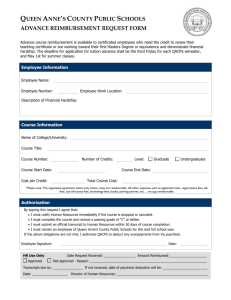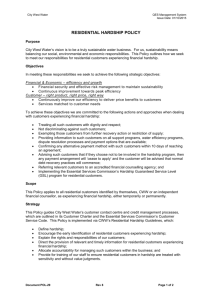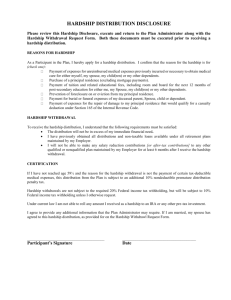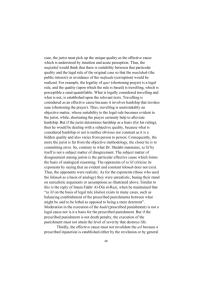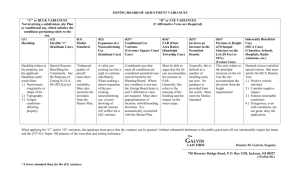Extreme Hardship
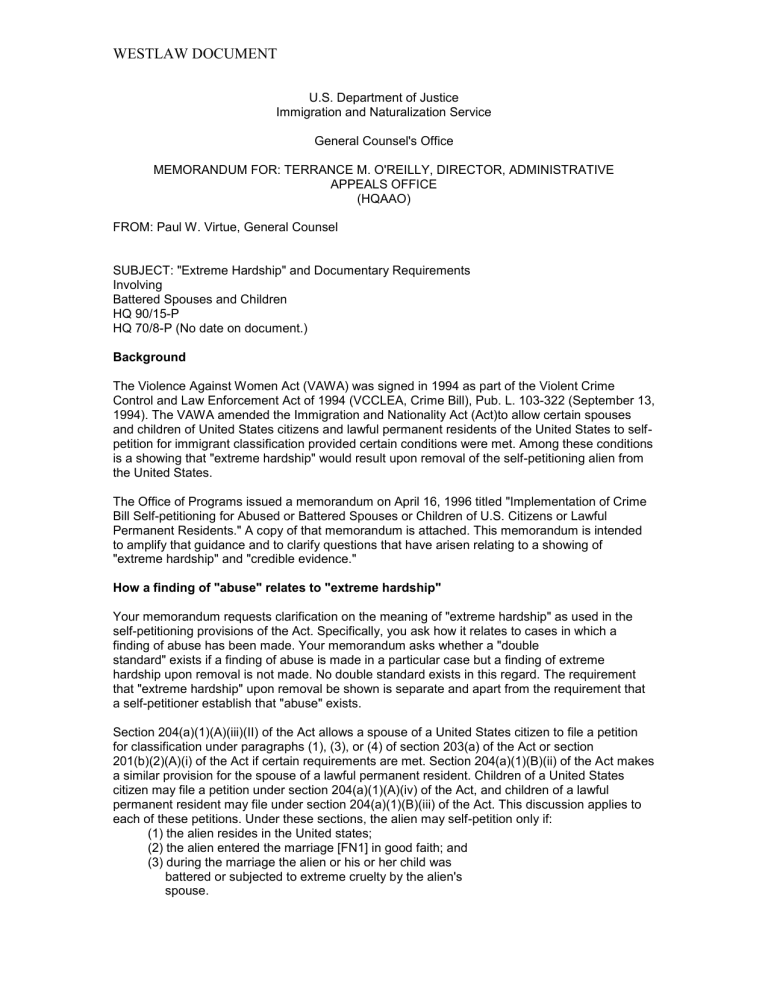
WESTLAW DOCUMENT
U.S. Department of Justice
Immigration and Naturalization Service
General Counsel's Office
MEMORANDUM FOR: TERRANCE M. O'REILLY, DIRECTOR, ADMINISTRATIVE
APPEALS OFFICE
(HQAAO)
FROM: Paul W. Virtue, General Counsel
SUBJECT: "Extreme Hardship" and Documentary Requirements
Involving
Battered Spouses and Children
HQ 90/15-P
HQ 70/8-P (No date on document.)
Background
The Violence Against Women Act (VAWA) was signed in 1994 as part of the Violent Crime
Control and Law Enforcement Act of 1994 (VCCLEA, Crime Bill), Pub. L. 103-322 (September 13,
1994). The VAWA amended the Immigration and Nationality Act (Act)to allow certain spouses and children of United States citizens and lawful permanent residents of the United States to selfpetition for immigrant classification provided certain conditions were met. Among these conditions is a showing that "extreme hardship" would result upon removal of the self-petitioning alien from the United States.
The Office of Programs issued a memorandum on April 16, 1996 titled "Implementation of Crime
Bill Self-petitioning for Abused or Battered Spouses or Children of U.S. Citizens or Lawful
Permanent Residents." A copy of that memorandum is attached. This memorandum is intended to amplify that guidance and to clarify questions that have arisen relating to a showing of
"extreme hardship" and "credible evidence."
How a finding of "abuse" relates to "extreme hardship"
Your memorandum requests clarification on the meaning of "extreme hardship" as used in the self-petitioning provisions of the Act. Specifically, you ask how it relates to cases in which a finding of abuse has been made. Your memorandum asks whether a "double standard" exists if a finding of abuse is made in a particular case but a finding of extreme hardship upon removal is not made. No double standard exists in this regard. The requirement that "extreme hardship" upon removal be shown is separate and apart from the requirement that a self-petitioner establish that "abuse" exists.
Section 204(a)(1)(A)(iii)(II) of the Act allows a spouse of a United States citizen to file a petition for classification under paragraphs (1), (3), or (4) of section 203(a) of the Act or section
201(b)(2)(A)(i) of the Act if certain requirements are met. Section 204(a)(1)(B)(ii) of the Act makes a similar provision for the spouse of a lawful permanent resident. Children of a United States citizen may file a petition under section 204(a)(1)(A)(iv) of the Act, and children of a lawful permanent resident may file under section 204(a)(1)(B)(iii) of the Act. This discussion applies to each of these petitions. Under these sections, the alien may self-petition only if:
(1) the alien resides in the United states;
(2) the alien entered the marriage [FN1] in good faith; and
(3) during the marriage the alien or his or her child was
battered or subjected to extreme cruelty by the alien's
spouse.
WESTLAW DOCUMENT
In addition to these requirements, the alien must demonstrate that his or her removal would, in the opinion of the Attorney General, result in extreme hardship to the alien or the alien's child.
These requirements are conjunctive, joined in the statutory text either by comma or by the word
"and." As such, each must be met separately.
The VAWA was enacted to end a battering spouse or parent's control over the petitioning process and thus remove the petition as a means of controlling or intimidating an abused spouse or child.
Thus a finding that the spouse or child has been "battered or subjected to extreme cruelty" is one of the threshold elements of the VAWA claim. While abuse is certainly a hardship to the victim in the ordinary meaning of the word, it is not a hardship whose existence depends upon whether or not the victim is removed. Congress clearly intended that aliens who establish that they or their child were battered or subjected to extreme cruelty by their spouse also establish that their removal would result in extreme hardship to themselves or their child could in order to selfpetition under these provisions.
Extreme Hardship
A separate prerequisite to filing a self-petition under the battered spouse or child provisions of
Section 204 of the Act is that "the alien is a person whose removal, in the opinion of the Attorney
General, would result in extreme hardship to the alien or a child of the alien." Neither the text of the Crime Bill nor the INA itself sheds any light on the meaning of "extreme hardship" in this or any other context. The meanings of this term have, however, been well explored in the judicial and administrative setting.
The phrase "extreme hardship" has long been present in the INA. [FN2] It has been most fully explored, however, in the context of suspension of deportation cases under former section 244 of the Act. While the discussion in these cases is helpful, adjudicators must keep in mind the unique, sensitive nature of cases involving battered spouses or children, and evaluate the relevant factors in light of that special nature. No one factor will require a finding of extreme hardship whenever it is present, nor will the absence of any one factor preclude such a finding when it is absent. All factors must be considered.
Any discussion of extreme hardship must begin with Matter of Anderson, 16 I&N Dec. 596 (BIA
1978), which was a suspension of deportation case. In Anderson, the Board established the basic factors to be considered in determining the existence of "extreme hardship." These are:
(1) the alien's age,
(2) length of residence in the United States,
(3) family ties in the United States and abroad,
(4) health,
(5) financial status, business, or occupation,
(6) the possibility of other means of adjustment of status,
(7) the alien's immigration history,
(8) the alien's position in the community,
(9) and the economic and political conditions in the country to which
the alien may be returned.
These factors were derived from a discussion in a committee report in the 94 th Congress on
Section 4 of H.R. 8713, a bill which would have provided for discretionary adjustment of status for certain aliens whose deportation would result in "unusual" hardship. Although the bill was never enacted, Congress' discussion of "unusual hardship" informed the Board's consideration of
"extreme hardship" in Anderson. Subsequent case law has refined and added to the Anderson factors. [FN3]
The Board has held that extreme hardship is not a definable term of fixed and inflexible meaning, and that the elements to establish extreme hardship are dependent upon the facts and
WESTLAW DOCUMENT circumstances of each case. See Matter of Chumpitazi, 16 I&N Dec. 629 (BIA 1978); Matter of
Kim, 15 I&N Dec. 88 (BIA 1974); Matter of Sangster, 11 I&N Dec. 309 (BIA 1965). Each case must be carefully evaluated, and all possible hardship factors must be weighed together. See,
Turri v. INS, 997 F.2d 1306 (10thCir.1993); Hernandez-Cordero v. INS, 819 F.2d 558, 563 (5th
Cir.1987); Prapavat v. INS, 662 F.2d 561 (9 th Cir.1981).
Factors which may not alone be determinative should be considered, and may become a significant or even critical factor when weighed with all the other circumstances presented. These factors should be viewed in light of the Board's statement that a restrictive view of extreme hardship is not mandated either by the Supreme Court or by its own case law. See Matter of L-O-
G-, Interim Decision 3281 (BIA 1996). Moreover, adjudicators reviewing battered spouse and child petitions should be mindful of the remedial nature of the self- petitioning provisions of the
Act. Remedial provisions should generally be construed in favor of the class intended to benefit from the remedy. See, Wadman v. INS, 329 F.2d 812 (9th Cir.1964). Finally, reviewers of these cases should take an open and flexible approach to the issue of extreme hardship, keeping in mind that the fact that a particular scenario has not previously appeared in the "extreme hardship" case law by no means suggests that it cannot now amount to "extreme hardship". While no discussion can address the infinite range of factual circumstances that will arise in battered spouse and child cases, certain circumstances are more commonly found.
Economic factors will frequently arise in the extreme hardship analysis. Though economic detriment alone is insufficient to support a finding of extreme hardship. Palmer v. INS, 4 F.3d 482,
488 (7th Cir. 1993); Mejia-Carrillo v. United States INS, 656 F.2d 520, 522 (9th Cir. 1981), it is a significant factor which must be weighed in evaluating the totality of an applicant's situation. The alien's inability to secure adequate employment in his or her home country is especially relevant in this regard. Adjudicators must take into consideration the economic conditions in the alien's home country, as well as unique characteristics of the alien which, when viewed in light of those circumstances, will affect his or her ability to secure employment. For example, an employable child who has spent most of his or her life in the United States may have language difficulties in the home country making employment difficult. Cultural factors in a particular country may affect a female alien's employment opportunities. While these examples are by no means exhaustive, they are intended to illustrate the open and creative approach adjudicators must bring to this issue.
There are many factors that are either unique to the battered spouse or child self-petitioner or of heightened significance in those cases. For example, many countries either do not have laws protecting victims of abuse or domestic violence or in fact have laws or practices which legitimize violence against women. Adjudicators must also consider the presence of relatives or friends of the abuser who might perpetuate the abuse in light of the lack of these protective laws.
Similarly, the abused spouse or child may be ostracized or may be stigmatized either because of his or her failed marriage, victimization, or abuse. Certain cultures may penalize a female alien for taking action against her spouse to stop the abuse. The adjudicator must be aware of these conditions and weigh them accordingly in making a determination of extreme hardship. Even when country conditions are not overtly hostile to the abuse victim, the lack of medical, social, and psychological services for the abuse victim and the effect that will have on the victim must be considered. While it is the self- petitioner's burden to produce this information and establish that extreme hardship does exist in his or her case, adjudicators should keep in mind that many selfpetitioners will be unable to articulate or fully develop these concepts beyond a generalized statement of fear or anxiety. Adjudicators should make themselves aware of relevant country conditions by consulting the Department of State's Country Reports on Human Rights Practices, published annually. Also informative and published annually is the CIA World Factbook.
Familiarity with these sources will ensure that each case is developed fully and adjudicated based on complete information.
WESTLAW DOCUMENT
Abuse victims may often be involved in legal proceedings relating to child custody, orders of protection, child support, alimony, criminal prosecutions against the abusive spouse, and other areas. Both the effect that removing the alien from the United States would have on these proceedings and the effect that the unavailability abroad of these proceedings would have on the alien must be considered as well.
There is no "scorecard" that can be provided to determine whether a particular alien's removal from the United States would lead to extreme hardship. Instead, adjudicators must take an open approach to the totality of the case. Adjudicators must keep in mind the fact that the guiding case law was developed in the context of applications for relief in deportation or removal proceedings against aliens already found deportable by an Immigration Judge. Aliens who file affirmative applications have not been the subject of a decision by the Service that their case merits the allocation of enforcement resources involved in a removal proceeding, and have not been found deportable by an immigration judge. Finally, adjudicators should also keep in mind the remedial nature of the self-petitioning statute.
Recent changes to the Act also shed light on the meaning of extreme hardship. Prior to 1962, section 244(a)(1) of the Act required "exceptional and extremely unusual hardship." In 1962,
Congress amended the suspension statute to require only "extreme" hardship, and left the
"exceptional and extremely unusual hardship" language intact solely for those aliens who were convicted of crimes, or who were otherwise deportable on other specified grounds. See Act of
October 24, 1962, Pub. L. No. 87-885, S 4, 76 Stat. 1247. The Board determined that in amending section 244(a)(1) in this manner, Congress intended to lessen the degree of hardship required to qualify for ordinary suspension of deportation. See Matter of Hwang, 10 I &N Dec. 448
(BIA 1964).
Similarly, before the passage of the Illegal Immigration Reform and Immigrant Responsibility Act of 1996, Pub. L. 104-208, 110 Stat. 208 ("IIRIRA"), suspension of deportation was governed by section 244 of the Act. IIRIRA eliminated that form of relief and replaced it with "Cancellation of
Removal", found in new section 240A of the Act. Suspension of deportation under section 244 previously required a showing only of "extreme hardship" in most cases and a showing of
"exceptional and extremely unusual" hardship in cases where deportability was based on criminal, security, or fraud-related grounds.
After IIRIRA, cancellation of removal requires a showing of "exceptional and extremely unusual" hardship in all cases involving aliens who would previously have applied for suspension of deportation under section 244 of the Act. Also, the hardship must be to the United States citizen or lawful permanent resident spouse or child. Significantly, however, Congress left intact the requirement that battered spouses and children show only "extreme hardship" before cancellation of removal (suspension) can be granted in their cases. Congress thus intended to apply a lower standard to battered spouses and children.
Documentary Requirements
Your memorandum also raises the question of what evidence rises to the level of "credible evidence." Generally primary or secondary evidence must be submitted with an immigrant visa petition. See 8 CFR 204.1. However, that section allows the battered spouse or child selfpetitioner to submit "any credible evidence" and does not require that the alien demonstrate the unavailability of primary or secondary evidence. This requirement stems from section
204(a)(1)(H) of the Act, which requires the Service to consider "any credible evidence which is relevant to the petition" before reaching a decision. A self-petition may not be denied for failure to submit particular evidence. It may only be denied on evidentiary grounds if the evidence that was submitted is not credible or otherwise fails to establish eligibility. It is within the Service's sole discretion to determine what evidence is credible and to determine what weight to give that evidence.
WESTLAW DOCUMENT
The determination of what evidence is credible is one that must be made by the adjudicating officer on a case-by-case basis. Frequently evidence that is credible in one setting will not be so in another. Evidence may be credible or incredible on either an internal or external basis. Evidence that is inconsistent with the other elements of the case or other evidence in the case is internally incredible. Evidence that does not conform to external facts, such as information contained in Service databases, is externally incredible. Adjudicators should carefully review evidence in both these regards before making a credibility determination. Much like the determination of extreme hardship, the determination of whether evidence is credible will often be a function of other elements of the case. For example, inconsistencies may accumulate so as to render the evidence submitted not credible. In other cases, apparent inconsistencies may disappear upon more careful examination and comparison with other evidence submitted.
Some general principles are applicable in making a credibility determination. The preamble to the
Service's interim rule implementing the VAWA states that "more weight will be given to primary evidence and evidence provided in court documents, medical reports, police reports, and other official documents ... self petitioners who submit affidavits are urged, but not required, to provide affidavits from more than one person. Other forms of documentary evidence may be submitted, including evidence... not ...identified in the Service's regulations." Petition to Classify Alien as
Immediate Relative of a United States Citizen or as a Preference Immigrant; Self-Petitioning for
Certain Battered or Abused spouses and Children, 61 F.R. 13061 (1996). This principle recognizes the fact that battered spouse and child self-petitioners are not likely to have access to the range of documents available to the ordinary visa petitioner for a variety of reasons. Many self- petitioners have been forced to flee from their abusive spouse and do not have access to critical documents for that reason. Some abusive spouses may destroy documents in an attempt to prevent the self-petitioner from successfully filing. Other self-petitioners may be self-petitioning without the abusive spouse's knowledge or consent and are unable to obtain documents for that reason. Adjudicators should be aware of these issues and should evaluate the evidence submitted in that light. Adjudicators should be sure to give the self-petitioner ample opportunity to add to the evidence submitted in support of the petition if necessary. As in the discussion of extreme hardship above, no scorecard can be provided to reach a conclusion that evidence in a particular case is credible. Each adjudicator must make that determination in each case based on the facts and circumstances of that case only, taking into account the limitations that pertain to battered spouse and child self-petitioners.
Paul W. Virtue
General Counsel
FN1. This requirement does not apply to children filing self-petitions as the victims of battery or extreme cruelty perpetrated by a LPR or USC parent. A child who is the derivative beneficiary of a parent who is claiming to have been battered or subjected to extreme cruelty by a USC or LPR spouse would of course be barred from any benefits as a derivative beneficiary if the principal petitioner did not meet the good faith marriage or any of the other requirements. This finding would not, however, preclude the child from filing independently provided he or she was the victim of battery or extreme cruelty inflicted by the USC or LPR parent.
FN2. Section 212(a)(9)(B)(v) allows a waiver of inadmissibility under
Section 212(a)(9)(B) of the Act (unlawful presence) in the case of an immigrant who is the spouse or son or daughter of a United States citizen or lawful permanent resident if the denial of admission to the alien would result in "extreme hardship" to the USC or LPR spouse or parent.
Section 212(h)(1)(B) allows for a waiver of inadmissibility under Sections 212(a)(2)(A)(i)(I), (II),
(B), (D), and (E) of the Act for an immigrant spouse, parent, son or daughter of a United States citizen or lawful permanent resident if the denial of admission to the alien would result in "extreme
WESTLAW DOCUMENT hardship" to the USC or LPR spouse, parent, son, or daughter. Section 212(i) of the Act allows for a waiver of inadmissibility under Section 212(a)(6)(C) of the Act (fraud or misrepresentation) in the case of an immigrant who is the spouse, son or daughter of a United States citizen or lawful permanent resident if the denial of admission to the alien would result in "extreme hardship" to the USC or LPR spouse or parent. Section 216(c)(4) of the Act allows for a waiver of the failure to file a petition to remove the conditions on conditional resident status if, among other things,
"extreme hardship" would result upon removal.
FN3. The Service will soon publish an interim regulation clarifying the scope of the term "extreme hardship" as part of its implementation of the cancellation of removal provisions of the Nicaraguan and Central American Relief Act of 1997, Pub. L. No 105-100, 111
Stat. 2193 (November 19, 1997), (Amended by Pub. L. No. 105-139, 111 Stat. 2644 (December
2, 1997)). While the clarification in that rule applies to all applications requiring "extreme hardship," it is not intended to be exhaustive and does not preclude the consideration of factors which it does not discuss. Adjudicators in all contexts, not only the VAWA context, should be sensitive to the circumstances unique to each case.

